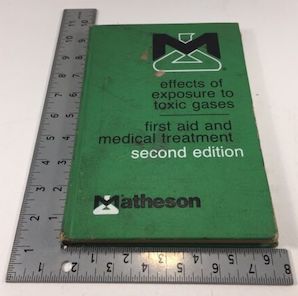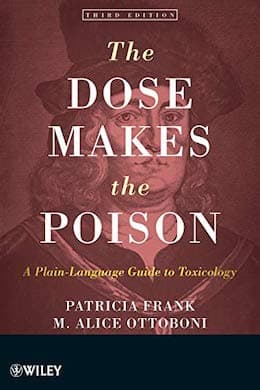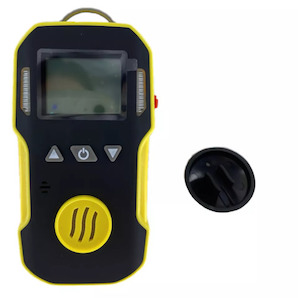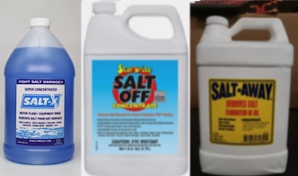
-----
What is the toxic effects of mixing muriatic acid and bleach?
Quickstart:
Bleach bottles warn us not to mix it with other materials: Bleach is chlorine gas dissolved in water. To stay dissolved, the solution must remain highly alkaline or the chlorine gas will come pouring out into the air.
Mixing bleach with any acid (CLR, Lime Away, pool acid, strong vinegar, etc.) can neutralize that alkali, and the air can fill with choking chlorine gas.
Q. My husband just used this acid then came back and used bleach while my daughter and I were in the dining area watching TV. Before you know it fumes started to enter the room; we sat there about 10 minutes then I began to cough ... and grabbed my 4 year old daughter. We went into the hallway with the front door open and the fumes were still coming into the hallway. She said she was a little dizzy. We sat in the car; she said she feels better. My throat hurts and my head. Should I wait to see if she feels better?
Ashley Baker- New Orleans
March 2, 2024
A. Sorry this happened to you Ashley. But please don't use the internet for medical advice.
You should at least call your doctor's office for yourself; but because 4 year old children are not experienced enough to fully understand & vocalize their situation, I think taking her to the doctor is in order.
Luck & Regards,

Ted Mooney, P.E. RET
Striving to live Aloha
finishing.com - Pine Beach, New Jersey
Ted can be retained for immediate
answers or long term project help
⇩ Related postings, oldest first ⇩
Q. At my friend's school, the janitor mistakenly mixed muriatic acid ⇦ on eBay or Amazon [affil link] with chlorine. Actually he poured this muriatic acid into the swimming pool by mistake. The fumes were very bad and after the students arrived at school, they were sent home. The teachers, were asked to stay. The fumes were so strong, it was making students as well as teachers sick. So what I'm asking is, what side effects could occur by ingesting this mixture? And, would this combination of chemicals be toxic.
Valda Lofton- Ann Arbor, Michigan
2003
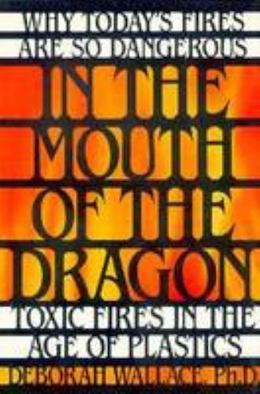
on eBay or Amazon
or AbeBooks
(affil link)
A. Adding muriatic acid to a pool is common. Something is not being told. Normal-reasonable additions will not cause the problem if the acid was added to the pool water. Now if it was added to the system in a manner that got to a chlorine tablet chlorinator, you could have a significant problem. My guess is that you use chlorine gas and a gross excess was added and more probably there was a chlorine leak or a boo-boo. Realize that this is speculation on the cause based on extremely limited information.
James Watts- Navarre, Florida
A. Hi, Valda. We metal finishers might be able to help with the side effects on the pool and building, but the question of side effects of this dangerous reaction on people is for doctors to tell you :-)
As Mr. Watts says, any analysis of the incident from this distance is speculation. But people can and do confuse bleach (sodium hypochlorite) with hydrochloric acid, and mixing them will generate chlorine gas and other nasty gasses.
I read about an evacuation of an entire neighborhood when a tank truck driver visiting a noisy shop asked the shop manager where "to [clang, clang] pump the [mumble, mumble] hypochlorite" and the shop manager said "pump the [clang, clang, mumble, mumble] hydrochloric " into "that tank there", resulting in mixing hundreds of gallons. A good reason for us to never abbreviate or use slang when speaking of calcium hypochlorite, sodium hypochlorite, or hydrochloric acid :-(

Ted Mooney, P.E.
Striving to live Aloha
finishing.com - Pine Beach, New Jersey
Ted can be retained for immediate
answers or long term project help
A. I re-read your question. First, to most of us, ingestion means eating or drinking it. If it is a gas, it would be inhalation. Second, toxic is in the dose -- a basic definition of toxicology. What was the product/byproduct of the event is anyone's guess because we do not know all of the items that were involved in the reaction. An approximate (very approximate) effect on the body would be to look up the MSDS for chlorine gas. Realize fully that there were probably trace amounts of other gasses.
James Watts- Navarre, Florida
A. The previous responses didn't fully answer your questions. Mixing bleach, or sodium hypochlorite with muriatic acid will liberate chlorine gas, which is definitely toxic, and a severe irritant to eyes and nasal passages and the lungs even in small amounts.
Lyle Kirmanconsultant - Cleveland Heights, Ohio
A. It's simple really, I work with chemicals all day long with swimming Pools and I was working with a former employee and he mixed the two by accident, it created a white toxic gas and nearly killed us both. The acid is strong if breathed in, but is deadly if mixed with chlorine. If breathed in, it's fatal.
Chaz Farmer- Atwater, California
September 24, 2009
A. Basically the combination of Muriatic Acid and Chlorine is mustard gas or a compound much like it. Very bad stuff, highly toxic and deadly in even small amounts. I spilled a small amount of acid on the floor where there was a small amount of chlorine powder from tablets for the pool and it made a fair amount of dirty cloud appearing gas. I breathed in a small amount before I got out and had lung and breathing problems for 6 months to a year afterwards.
Chris Hatfield- Two Harbors, Minnesota
January 26, 2010
To Chris Hatfield above:
Mixing Muriatic (hydrochloric) acid and Chlorine is *definitely not* 'Mustard Gas'. Mustard is synthesized from rapeseed plants (using other chemicals and processes), the same place we get "canola" oil from. HCl and Cl mixing as mentioned in other posts here will produce Chlorine Gas, which is a true gaseous substance, while Mustard is distributed as an aerosol or droplet form, not a gas. The term 'gas' in 'Mustard Gas' is a misnomer. It got that name in WWI, where the use of chemical agents in warfare is well known - everyone simply called the agents 'gas' because it was a simpler term to use on the battlefield. Tragically, both sides of the conflict used Mustard and Chlorine Gas to great effect.
chemical demilitarization - Norfolk, Virginia, USA
August 12, 2011
Multiple threads merged: please forgive chronology errors and repetition 🙂
Q. Hi I was at work and I mixed phosphoric acid with bleach by accident we inhaled a bit of it then left the room for fresh air. But my throat was not burning but scratchy like I was catching a cold. My chest felt like some one was sitting on me. I felt better after drinking several bottles of water and inhaling fresh air. I wonder should I go to the doctor. It has been several hours and I feel fine. What would the doctor do that I can't do at home.
Anissa PendergrassCustodian - Louisville, Kentucky, United States
November 21, 2008
A. Hi, Anissa. Glad you are feeling better. You have inhaled chlorine gas but it is certainly possible that you are fine; unfortunately it's impossible for me to hazard a guess as to what your doctor might or might not discover from examining you. And I can't comment because without medical training. I don't even know whether your doctor would have a particular test or inspection he would want to do based on the accident and your medical history. At this point, if you have a regular doctor, just phone the office, tell them what happened and let them decide.
But what the heck is happening out there in worker land, where signs are supposed to be posted "Report EVERY accident, NO MATTER HOW MINOR!".
Regards,

Ted Mooney, P.E.
Striving to live Aloha
finishing.com - Pine Beach, New Jersey
Ted can be retained for immediate
answers or long term project help
A. Chlorine gas is very irritating. I mixed bleach with potassium permanganate ⇦ on eBay or Amazon [affil link] and it was very irritating. I was better after a few hours.
TSL Lofland- Marshall, North Carolina
August 12, 2022
A. Magazine: "C&EN" (Chemical and Engineering News) 13-Nov-2019
Incidents like this, which create chlorine gas, occur more than 2,000 times per year in the US.
Be safe ...
- Winnipeg, CANADA
August 12, 2022
Q. Hi, I'm in the concrete application business. I usually mix a solution of Chlorine and a degreaser to wash concrete. I also etch concrete by mixing a solution of Muriatic acid and water: 1/3.
I mistakenly added acid to chlorine thinking the chlorine was water and I got one hell of a reaction. What took place chemically?
contractor - largo Florida USA
October 18, 2010
A. Hi, Ray. As you see, we appended your inquiry to a previous similar thread which may answer it for you. You're probably lucky to be alive! For one thing, this reaction releases chlorine gas and other toxic gasses. Sodium hypochlorite or calcium hypochlorite is basically chlorine gas dissolved into a watery alkaline solution. If you destroy the alkalinity by adding acid, you destroy the liquid's ability to keep the chlorine gas in solution, and it is all suddenly released as inhaleable chlorine gas.
You need written procedures that preclude it from happening again. Also please don't use slang or shortcuts like 'chlorine' to speak about chemicals because that contributes to accidents as described earlier on this thread. Find out the exact name of that 'chlorine' solution, and use its full name to prevent "chlorine" from being misunderstood as " 'chloric". Good luck.
Regards,

Ted Mooney, P.E.
Striving to live Aloha
finishing.com - Pine Beach, New Jersey
Ted can be retained for immediate
answers or long term project help
Q. I just accidentally pumped some chlorine into what I thought was an empty 1 Gal Milk jug.
It contained Muriatic acid (very little). It made a reaction & I took 1/2 a breath (scared reaction).
I feel Okay; eyes a little blurry.
Do I need to see a doctor?
Thank You.
Hobbyist - Castaic, California USA
A. Hi, Daniel. Call the doctor's office. The nurse answering the phone will ask you some questions and decide whether she thinks you should visit. If the person answering is not a qualified nurse who can help you, you should see a different doctor rather than that one :-)
Regards,

Ted Mooney, P.E.
Striving to live Aloha
finishing.com - Pine Beach, New Jersey
Ted can be retained for immediate
answers or long term project help
Q. I do a lot of swimming in chlorinated swimming pools. On average, I will swim 5 times a week for 40 minutes a day (lap swim for exercise). This is a public olympic sized pool with very significant vertical clearance between the pool and the ceiling (about 100 feet).
What are the long term health consequences if any from repeated exposure to chlorine in the water?
How does the absorption of chlorine through the skin affect the acidity/alkalinity levels of the blood? Does it make the blood more acidic or alkaline, or is there no impact?
Please advise.
Thanks.
- Dallas, Texas
December 15, 2011
Ed. note: We don't know. But in this day & age we can at least be fairly confident that an epidemiologist has looked into it and not found a smoking gun.
Q. I work on a farm; we mix hypochlorite acid with a dash of washing up liquid to clean the parlour walls. Very strong smell ... is this safe?
adam hart- england, shropshire
February 20, 2013
A. Hi Adam. I'm not here to be a stickler, but you need to find out what chemicals you are actually talking about; there is no such thing as "hypochlorite acid" and sloppy wording is a major cause of these accidents which can be fatal.
Diluted bleach is often used as a disinfectant, but if the smell is too strong, you perhaps need to make it up much more dilute. If "washing up liquid" is British for hand soap or dish detergent for hand-washing dishes, you can add it to diluted bleach without a problem. Good luck.
Regards,

Ted Mooney, P.E.
Striving to live Aloha
finishing.com - Pine Beach, New Jersey
Ted can be retained for immediate
answers or long term project help
Q. Sorry Ted for being so vague. Been at work today and had a look and it's a sodium hypochlorite solution which we're mixing with normal house-hold washing up liquid.
Rough average mix is one large bucket of hypo to quarter a cup of washing up liquid.
Any idea if this is safe as the fumes are quite strong!
Appreciate any advice.
thanks
- england, shropshire
February 23, 2013
A. Hi again Adam. The more we learn, the more we learn that there is no such thing as safe vs. unsafe . . . it's all relative. So if it smells really strong, it's too strong, try simply making it up weaker.
I don't know why you are doing this anyway though. I've heard of disinfecting once to stop mold after a flood, and I've heard of washing bathroom fixtures with very diluted bleach, but I'm not familiar with anyone making a habit of washing their parlor walls with bleach. Unless your farmhouse is also some sort of abattoir or I'm misunderstanding in some way, I'd suggest you just stop :-)
Regards,

Ted Mooney, P.E.
Striving to live Aloha
finishing.com - Pine Beach, New Jersey
Ted can be retained for immediate
answers or long term project help
Q. I am a Spa Attendant at a large hotel. I work in the baths, the area with numerous large indoor hot tubs & soaking tubs. We do not maintain the pH balance or the pumps, another department does. Often the air is very strong and burns and I get dizzy. One morning, I was opening and a large indoor tub was backwashed; a large amount of acid gas was expelled and I was exposed and had incurred a respiratory burn. I still have numerous symptoms 6 weeks later from the blast of gas. I later found out it was a mixture of Muriatic Acid and Chlorine. The pumps had gone down over night, the gas had built up and the pH level of the pool had been 2 or below for days prior.
Can you give me any insight into what chemical soup I was exposed to? After the initial exposure, they brought the pool into balance while we were still in the room by adding, Sodium Bicarbonate, Anhydrous. Where did the acid go and what reaction occurs when the bicarbonate was added? I was exposed for 2 hours before becoming completely overwhelmed. Please help!
Eva Young- Wailuku, Hawaii, Maui
July 22, 2014
A. Hi Eva. The neutralization of the acid with sodium bicarbonate did you no further harm. Sodium bicarbonate is just baking soda [in bulk on
eBay
or
Amazon [affil link]
and it was used to bring the pH back up from 2 to whatever pH you normally maintain. In reacting with the acid, it generated NaCl (table salt), carbon dioxide, and water -- all of which are harmless.
HCl + HNaCO3 => NaCl + CO2 + H2O
The tubs used chlorine as disinfectants, and the problem is that when way too much hydrochloric acid was added, bringing the pH down to below 2, the chlorine cannot stay dissolved in the water, but is released as a gas -- and breathing such an excess is very bad for you. The good news is that every doctor will understand the issue and be able to do for you what can be done.
Regards,

Ted Mooney, P.E.
Striving to live Aloha
finishing.com - Pine Beach, New Jersey
Ted can be retained for immediate
answers or long term project help
Q. Thank you for your reply and insight. The hotel uses a 3" Chlorine Tablet and Muriatic Acid. Would you perhaps know what these chemicals combine into as they sat stagnant overnight in the broken pump? Is it Chlorine Gas or something else? I was only told it was "Acid" and given the MSDS sheets on the two raw chemicals, not what type of gas or reaction they have when combined. Your expertise is very much appreciated.
Eva Young [returning]- Wailuku, Hawaii, Maui
A. Hi again Eva. Muriatic acid is hydrochloric acid, HCl. "Chlorine tablet" is slang -- the tablets are actually calcium hypochlorite, Ca(OCl)2. Yes, mixing the two releases chlorine gas.
The reaction is: Ca(OCl)2 + 4 HCl => CaCl2 (harmless salt) + 2 H2O (water) + 2 Cl2 (chlorine gas)
Get well soon.
Regards,

Ted Mooney, P.E.
Striving to live Aloha
finishing.com - Pine Beach, New Jersey
Ted can be retained for immediate
answers or long term project help
A. Hi Ted,
Your responses are excellent, although I'm not sure how your metal finishing site swerved into answering questions regarding hotel spa chemical accidents! :)
I would like to respectfully offer one minor correction/addition, however: Although Calcium Hypochlorite or "Cal Hypo" is sometimes offered in tablet form, 3" "chlorine tablets" are more commonly trichloro-s-triazinetrione, otherwise known as "Trichlor." The net effect of the combination of this product with muriatic acid is the same: Chlorine gas is released.
Todd HubbardPool Contractor - Bradenton, Florida, USA
![]() Thanks a lot Todd. Your question was probably rhetorical, but the metal finishing industry uses very large quantities of hydrochloric acid for pickling, and large quantities of sodium hypochlorite for wastewater treatment (destroying cyanide) and some other purposes -- so mixups and accidents that are chemically very similar happen.
Thanks a lot Todd. Your question was probably rhetorical, but the metal finishing industry uses very large quantities of hydrochloric acid for pickling, and large quantities of sodium hypochlorite for wastewater treatment (destroying cyanide) and some other purposes -- so mixups and accidents that are chemically very similar happen.
I already mentioned a major mishap requiring a neighborhood evacuation when a truck driver pumped hundreds of gallons of sodium hypochlorite into a plating shop's hydrochloric acid storage tank rather than the right tank. I can hear the careless, shouted factory floor discussion in my head: "Hey buddy, (clang, clang) is this (brooohm, brooohm) the hypochlorite (garbled) (chih chih chih) tank?" "I'm in the middle of somethin pal, but yup, that there's (headnod, squeak, bang, sctitch) the hydrochloric (garbled) (screech, screech)."
Regards,

Ted Mooney, P.E.
Striving to live Aloha
finishing.com - Pine Beach, New Jersey
Ted can be retained for immediate
answers or long term project help
A. A big majority of commercial pools use far too much chlorine in their pools. Part of it is lack of knowledge, part of it is because they don't want to adjust the chemicals more than once a day or longer ,and part of it is management that do not want there to be any possibility of a health claim against them for not having a proper "sanitary" pool. More than a few people besides kids pee in the pool.
James Watts- Navarre, Florida
![]() Can I just say that this thread has been thoroughly interesting and insightful. I am the Hygiene Manager of a food production factory in London, England. We use acid and chlorinated products and have to do so on separate days of the week (acid on Sundays only). There is a fine balance throughout the whole of the factory's operation to soften our water supply (as we're in a hard water area) and thus reduce the build up of limescale deposits so that we can limit our use of Nitric Acid which we use as a descaler. Another issue we have is using Paracetic acid
⇦ on
eBay
or
Amazon [affil link] to eliminate Listeria as we have to fog with the acid following the clean-down with chlorinated and alkaline based products. We have a strict regime which starts with designing our processes, reviewing them regularly and training, and restricting the use and access to all chemicals on site.
Can I just say that this thread has been thoroughly interesting and insightful. I am the Hygiene Manager of a food production factory in London, England. We use acid and chlorinated products and have to do so on separate days of the week (acid on Sundays only). There is a fine balance throughout the whole of the factory's operation to soften our water supply (as we're in a hard water area) and thus reduce the build up of limescale deposits so that we can limit our use of Nitric Acid which we use as a descaler. Another issue we have is using Paracetic acid
⇦ on
eBay
or
Amazon [affil link] to eliminate Listeria as we have to fog with the acid following the clean-down with chlorinated and alkaline based products. We have a strict regime which starts with designing our processes, reviewing them regularly and training, and restricting the use and access to all chemicals on site.
To everybody who has experienced the liberation of Chlorine Gas, I hope you make a full recovery. To everyone else who added comments, there were some really excellent observations and analysis and I really enjoyed and learnt a lot from them - thank you.
- London, UK
November 23, 2017
Q. Hi, my name is tony; I work for a pool company. Last Monday I was at one of my commercial pools. I did my service but when it was time to add my chemicals another tech that was there on Saturday before me added some trichlor granules to the tanks where we add our chlorine to. I was unaware that he did that and I inhaled quite a bit of the gas. It's now a week later I'm still coughing, chest tight. Should I be worried or will it go away or should I see a doctor?
Antonio R [last name deleted for privacy by Editor]- Labelle Florida usa
February 20, 2018
A. Hi Antonio. Actually, your employer should have a workplace injury reporting program which demanded that you go to the doctor immediately. I can't count the times I've seen signs: "Report every injury, no matter how minor!" This should have been reported by you and you should have seen a doctor immediately.
Regards,

Ted Mooney, P.E. RET
Striving to live Aloha
finishing.com - Pine Beach, New Jersey
Ted can be retained for immediate
answers or long term project help
Hypochlorite Acid [sic] Replacement
Q. I'd like to seek your valuable advise if you have any idea about a replacement chemical that has same efficiency of removing salt scales from pipework as the Hypochlorite Acid in order to support my research.
The usage of Hypochlorite Acid in my workplace is mainly applied to washing Sodium Hypochlorite skids that produce chlorine to kill marine growth on offshore equipment. And usually maintenance staff have to use acid to wash the salt scales that remain in the pipework of the system on monthly basis.
Appreciate your kind support and advise.
- Qatif/ Saudi Arabia
February 26, 2018
A. Hi cousin Essa. There is no such thing as "Hypochlorite Acid", and it is very important that you clearly understand the difference between sodium hypochlorite (chlorine bleach) and hydrochloric acid or a disaster may await you. Whole neighborhoods have had to be evacuated when similar mistakes were made, and calling hydrochloric acid 'hypochlorite acid' is a perfect invitation for that to happen :-(
There is probably nothing which will be quite as effective as hydrochloric acid in quickly removing salt scale, but you can look up the MSDS for milder proprietary products like C-L-R (Calcium-Lime-Rust Remover) ⇦ on eBay or Amazon [affil link] and thoroughly rinse everything first to dilute it before using the acid; or better yet, see if acid-free materials like Salt-Away ⇦ on eBay or Amazon [affil link] or Starbrite Salt-off ⇦ on eBay or Amazon [affil link] will do the job. Good luck.
Regards,

Ted Mooney, P.E. RET
Striving to live Aloha
finishing.com - Pine Beach, New Jersey
Ted can be retained for immediate
answers or long term project help
A. Hydrochloric acid (HCl) or Hypochlorous acid (HClO)?
Probably either one is overkill for removal of salts. Most salt scale can be removed fairly easily with a mild acid (citric, acetic, etc.) and even if your particular case needs a stronger acid, I would go phosphoric or sulfuric before hitting hydrochloric or hypochlorous.
All subject to environmental impact concerns as well. Like Ted said, many pH neutral products are available to do this also.

Ray Kremer
Stellar Solutions, Inc.
McHenry, Illinois

Q. Hi Ted and Ray for your valuable comments, they are really inspiring but I'd like to know what kind of filters can reduce the salt scales.
Besides replacing the acid chemical by salt remover, I would think of having some filters at the inlet of the system such as calcium or magnesium to reduce the amount of salt scaling through the system.
Do you recommend such ideas?
Kind regards
Essa
- Qatif, East, Saudi Arabia
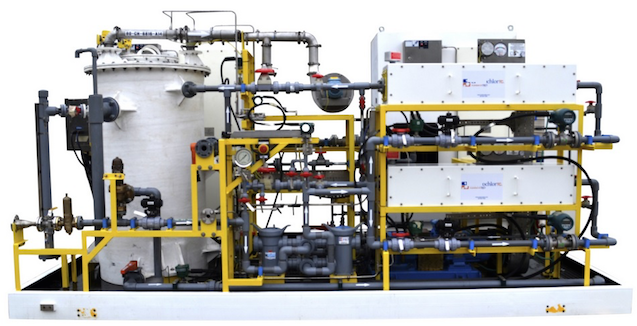
(www.globaltreat.com/on-site-chlorine-generator.php)
A. Hi again, Essa. Although we've talked about how to remove salt from pipes, I don't actually have any real understanding of what you are doing that is causing salt accumulation in the pipes so I am unable to offer suggestions on how to reduce it.
I'm guessing that your company builds chlorine generators, or operates them as a service, and that somehow the chlorine is used in fire protection, pump stations, etc. to discourage marine growth.
But I'm not really picturing what piping is accumulating salt or why. And when you speak of washing the skid, I assume you don't mean washing the skid, per se, but the inside of the piping which is mounted on the skid? Sorry, but I have no familiarity with that technology.
Regards,

Ted Mooney, P.E. RET
Striving to live Aloha
finishing.com - Pine Beach, New Jersey
Ted can be retained for immediate
answers or long term project help
Q. Hello Ted,
thanks for your patience with me :D
And you are right we have on-site sodium hypochlorite skid that produces chlorine to kill the marine growth that accumulates on off-shore equipment.
The basic operation of sodium hypo system consist of the following:
NaCl + H20 + 2e -------------------- NaOCl + H2
Salt + Water + Energy -------------- Hypo + Hydrogen
Therefore, cathodic deposits from the salt and water reaction usually accumulate in the cell causing electrolysis cell blockage.
Calcium and magnesium are the elemental materials that cause the deposits which require regular acid wash to remove them.
So, here we go!
My first question was seeking for a safer replacement of Hydrochloric acid
The other question, I wonder if we use Calcium and magnesium filtration on the inlet seawater feeder to the system will minimize the deposit accumulation or it will affect the electrolysis process and chlorine purity?
Kind regards
- Qatif - Saudi Arabia
Q. I would like to dissolve some downspout leaves by spraying, etc., with an acid possible mixture. Any suggestions?
Gabriel Groves- Indianapolis Indiana
March 31, 2018
A. Hi Gabriel. I don't know if "Don't Do It!" is the kind of suggestion you're looking for, but anything which can dissolve dead vegetation will wreak total havoc on the live stuff. And if your downspouts are aluminum, like most are, the caustic materials which dissolve the organic matter will destroy them.
Putting a water hose with nozzle into the downspout from the bottom instead of the top (dress in old clothes, and do it when you already need a shower, it'll probably make quite a mess, but it will work). Good luck :-)
Regards,

Ted Mooney, P.E. RET
Striving to live Aloha
finishing.com - Pine Beach, New Jersey
Ted can be retained for immediate
answers or long term project help
Q. Doing color plaster, stucco, or plaster we use muriatic acid to clean the stainless trowels.
Noticed that now it doesn't make them shine. Has muriatic acid been diluted? Did spill bleach into muriatic acid & was prepared because working with the acid takes lots of caution.
Caught just a whiff and covered it, diluted it, & got rid of it (having an activated charcoal mask on).
Maybe it's the high humidity & wet bulb that have gotten some mold/fungus onto the trowels?
Nicholas Robert MaffeiTraditional plaster, stucco, re-pointing - New York usa
June 9, 2018
A. Hi Nicholas. Glad to hear you were wearing protective equipment and weren't hurt.
Yes, bleach is very strongly alkaline, so if accidentally mixed with acid will -- in addition to releasing dangerous chlorine fumes -- neutralize the acid. You probably need fresh acid if that's how you remove the plaster remnants from your trowels and shine them ... but muriatic acid is terrible for stainless steel; any other acid at all would be less damaging.
Regards,

Ted Mooney, P.E. RET
Striving to live Aloha
finishing.com - Pine Beach, New Jersey
Ted can be retained for immediate
answers or long term project help
Q. I was sealing my driveway and thought I would also seal my garage floor where it was pitted from salt. After I sealed the garage floor it turned white. I then tried to clean it with clorox. It didn't work so I mixed up some muriatic acid. I didn't rinse the clorox off the floor before pouring the acid on it. What a mess. as soon as the acid hit the clorox there was a large cloud of fumes that I partially inhaled. I started chocking and couldn't breathe. I went to the ER and they told me I created a chlorine gas situation. After a few breathing treatments and some medication, 4 hours later the coughing subsided. How stupid was this and should I expect any latent effects from this episode?
George KisakRetired - Pittsburgh, Pennsylvania USA
October 9, 2019
A. Hi George,
Short answer: You will almost certainly be fine. See your doctor if you have any further recurring problems.
Long answer: Chlorine gas is a strong irritant (as you found out) and can be lethal in higher concentrations/prolonged exposure, but I think you will be alright in the long run. Just don't do it on a regular basis.
It was used as an early chemical weapon, but it is nowhere near as dangerous as mustard gas.
It forms HCl in your lungs, which is acidic and so will damage tissue, but not irrevocably so if the exposure wasn't very long.
- Katikati, New Zealand
Q, A, or Comment on THIS thread -or- Start a NEW Thread
